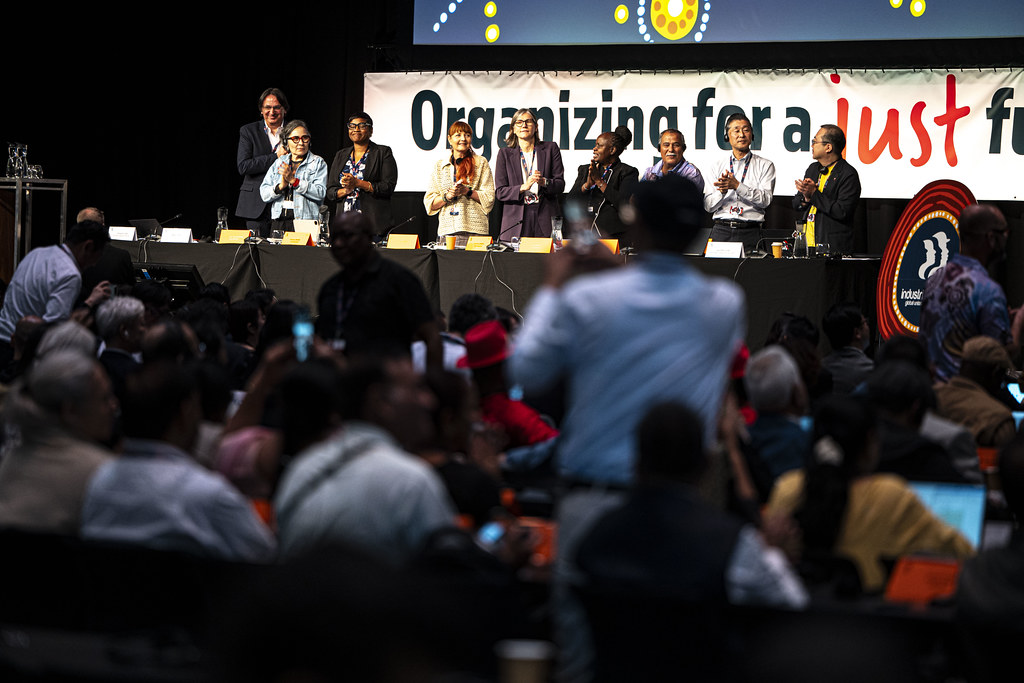Read this article in:
English
- Español
12 November, 2025At a time when democracy, peace, and decent work are under threat around the world, IndustriALL’s 4th Congress in Sydney brought together the global trade union movement to reaffirm its mission: to organize workers everywhere, defend rights and build a sustainable, just future for all.
For three days, more than a thousand delegates from nearly a hundred countries debated strategies to strengthen unions, fight inequality, hold global capital accountable and ensure that the industrial transitions of the future leave no worker behind. Guided by the Congress theme, Organizing for a Just Future, IndustriALL’s affiliates renewed their collective determination to turn solidarity into power, and power into change.
IndustriALL and IF Metall president Marie Nilsson opened the Congress by acknowledging that the world of work is being reshaped by technological change, authoritarian politics, and the climate emergency. Yet, she said, the answer lies in solidarity:
“We live in a time of rapid change… But when I look out over the Congress hall, I feel hopeful. I see our joint strength to face these challenges. We are determined to build a more sustainable future, mirrored in our slogan, Organizing for a Just Future.”
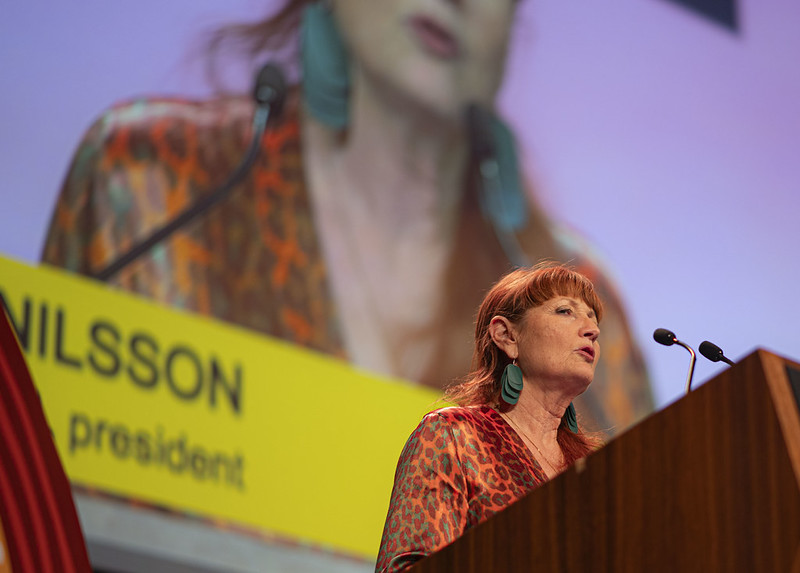
Marie Nilsson
Australian union leaders echoed that message. Michele O’Neil, president of the Australian Council of Trade Unions, reminded delegates that “there’s only one response to organized capital — and that is organized labour.” Tony Maher, general president of the Mining and Energy Union, welcomed participants on behalf of the host unions, stressing that Australia’s democracy and prosperity “are built on solidarity, not isolation.”
Australian Prime Minister Anthony Albanese, a lifelong ally of the labour movement linked Australia’s values to the global struggle for fairness:
“It is absolutely critical that no one is left behind as we go forward,” Albanese said. “We know that fairness, good working conditions and fair pay don’t undermine the labour market — growth and fairness are stronger together. Our purpose is eternal, and that is why solidarity is indeed forever.”
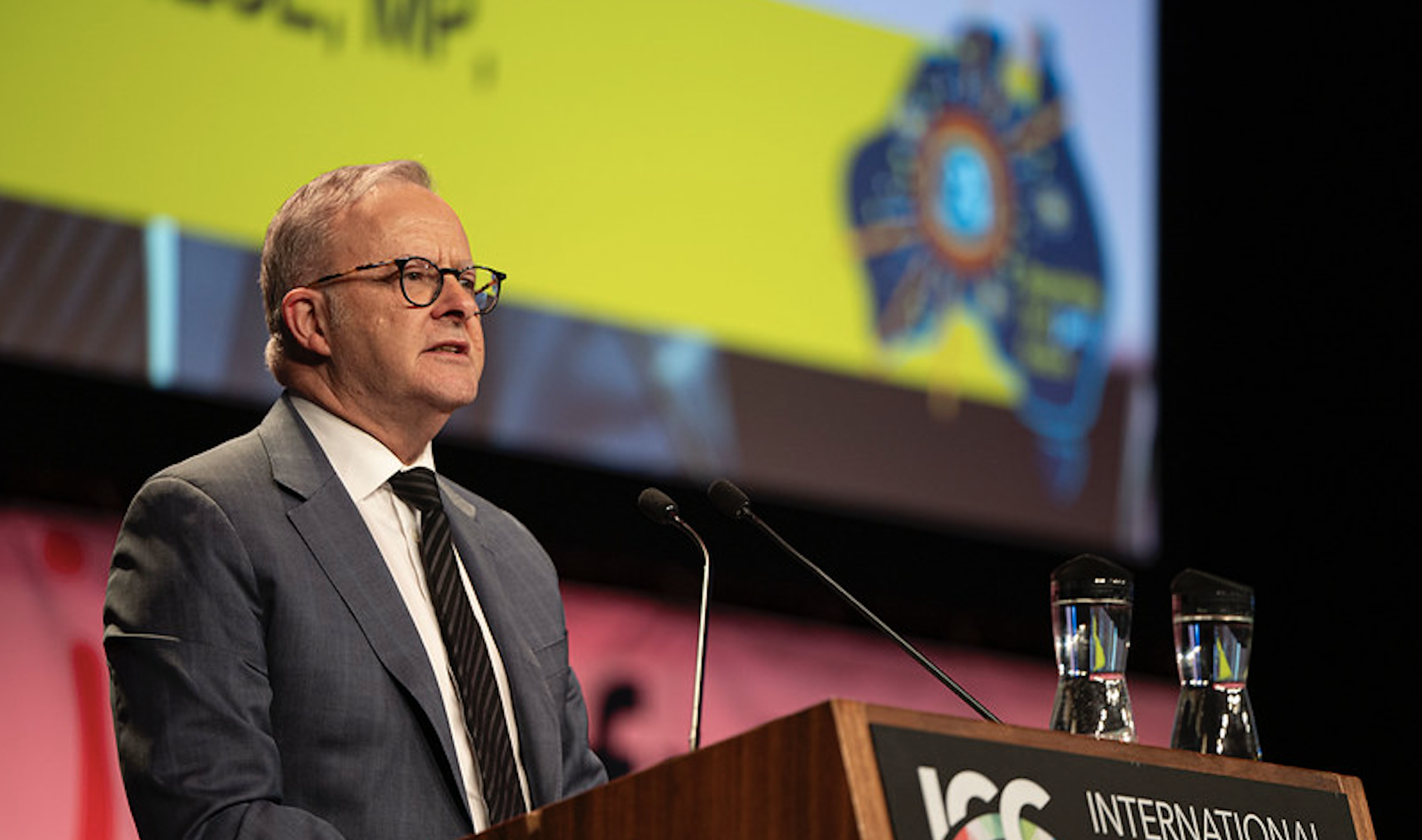
Prime Minister Albanese
Building union power
Across plenary sessions and action plan debates, delegates returned again and again to one central principle: only strong, democratic and inclusive unions can win justice for workers.
General secretary Atle Høie presented the Secretariat report for the Congress.
"Guided by the Action Plan adopted in 2021 and its four strategic goals, the Secretariat has carried out its work while devoting increasing attention to the growing attacks on democracy and fundamental rights, and to the vital role of unions in defending peace and social justice.
"Our focus is on strengthening trade unions, their capacity to negotiate collective agreements, to remedy violations of fundamental union rights, and to secure a better, more sustainable life for workers."
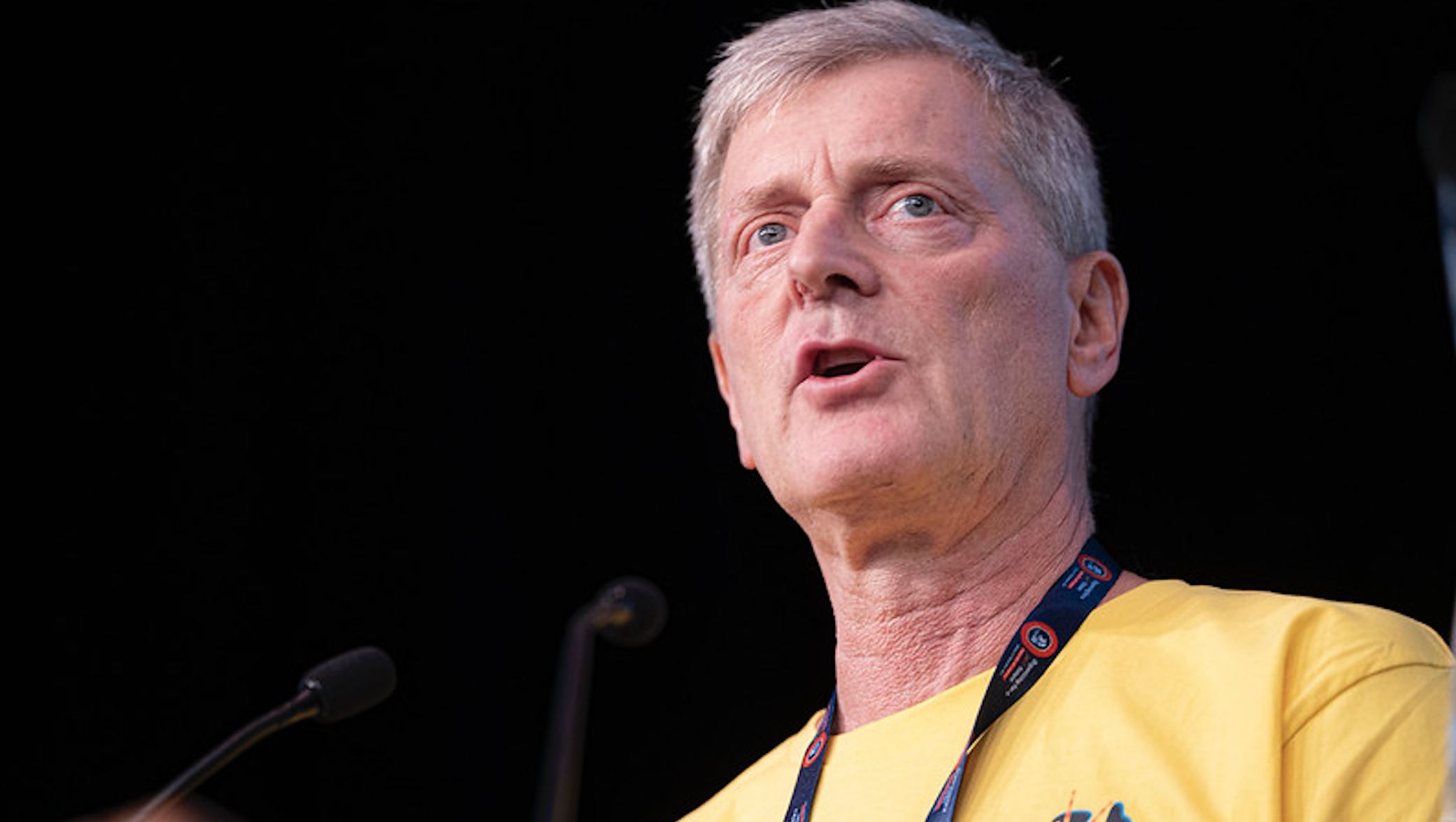
General secretary Atle Høie
Highlights included:
- The legally binding supply-chain-supported collective bargaining agreement in Cambodia, which will improve wages and working conditions for tens of thousands of workers across the country.
- The coming into force of the Hong Kong Convention for Safe and Environmentally Sound Recycling of Ships, already having a dramatic impact on safety and environmental protection.
- Indonesian unions' fight and win against the country's anti-labour Omnibus law
- Capcity building that makes a difference – 52 new youth structures have been developed – 53 new women structures – at least 372,383 new trade union members were recruited – 60,944 unionists participated in capacity building events.
- Succesfully increasing women's participation at IndustriALL's events. 43 per cent of delegates here in Sydney are women, compared to 28 per cent in Rio in 2016.
In the debate that followed, delegates from Palestine, Myanmar and Ukraine thanked IndustriALL and affiliates for their solidarity support. Trade unionists from Türkiye toThailand, from Brazil to South Africa, addressed Congress and shared how they are relentlessly fighting for workers' rights and a fair, sustainable world.
Action plan debates
Inequality is a defining challenge of our time. IndustriALL’s action plan is clear that only stronger trade unions and collective agreeements can change this narrative. Assistant general secretary Kemal Özkan warned that inequality is
“not an accident; it is the predictable result of rules written by and for those at the top. Our action plan clearly says: today’s inequalities undermine growth, social cohesion and democracy. We must change the rules, so the economy serves all people, not a narrow elite.”
Panelists described how inequality plays out in their regions — through wage stagnation, precarious work, discrimination, and unsafe conditions — and how unions are fighting back. Speakers from Kenya, Brazil, the United States, Iraq, Indonesia and India shared examples of organizing across gender, race, and employment status.
Maria Somma, USW North America, said:
"Research shows that when we organize and bargain across whole companies and supply chains, wage floors rise, contractors get equal pay and safety is enforced. Strong unions are democracy at work. Unions don't just lift individuals though; they lift the entire community."
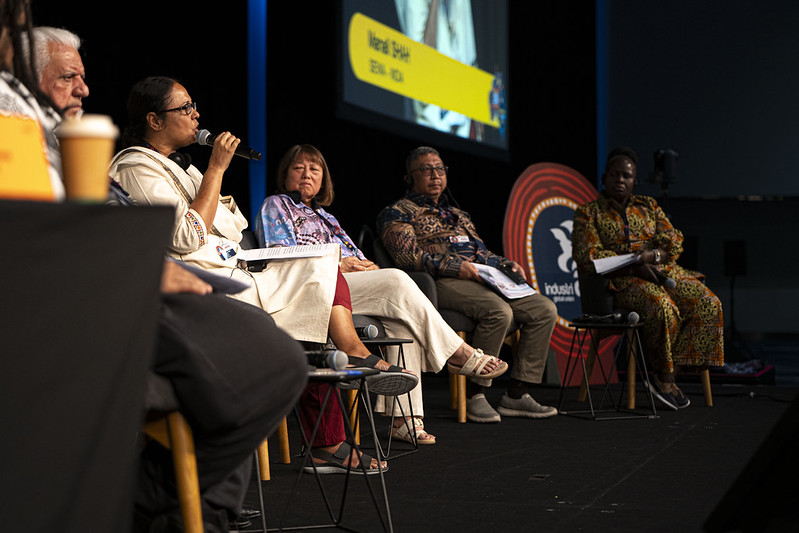
Speaking on the second session on the action plan, building union power general secretary Atle Høie reminded delegates of the importance of organizing.
“Building trade union power is not just our strategy — it is our survival. Only by organizing every worker, in every workplace, can we shape a future where labour stands stronger than capital.”
Delegates from across the world shared experiences showing how that power is built — from strengthening membership and leadership in Indonesia, to empowering younger generations in Peru, engaging white-collar workers in Ghana, defending workers’ dignity in India, and negotiating new agreements that deliver real gains in Morocco. Together, their stories reflected a shared commitment to expanding membership, unity, and solidarity across every sector.
Said Sanjay Vadhavkar, SMEFI, India:
“Building union power in this sector is not easy — it is a struggle that demands courage, persistence and vision. Organizing is not just about numbers — it’s about supporting workers, defending their dignity, and ensuring their rights are respected across the industry.”
A third pillar of the action plan is confronting the growing power of multinational corporations. Assistant general secretary Christine Olivier said that holding global capital accountable means
“demanding responsibility and insisting that corporations prioritize people over profit.”
Union leaders from Argentina, Italy, Tunisia, South Africa, the United States and Cambodia described their struggles and successes in winning fair wages, safety, and respect in global supply chains. From campaigning against union-busting at Mercedes-Benz in the U.S. to enforcing binding agreements in Cambodia’s garment sector, delegates made it clear that power must be organized at the same global scale as capital.
Athit Kong, CCAWDU Cambodia, said:
“We have the power to bring brands to the negotiating table. We organise from the ground up, from the supply chain up so we can put pressure on global companies and brands. When we have a binding agreement with a global brand then we can interpret that at the National and factory level. This brings results for our workers in the ground. By using our power, we can expand the benefits for our people.”
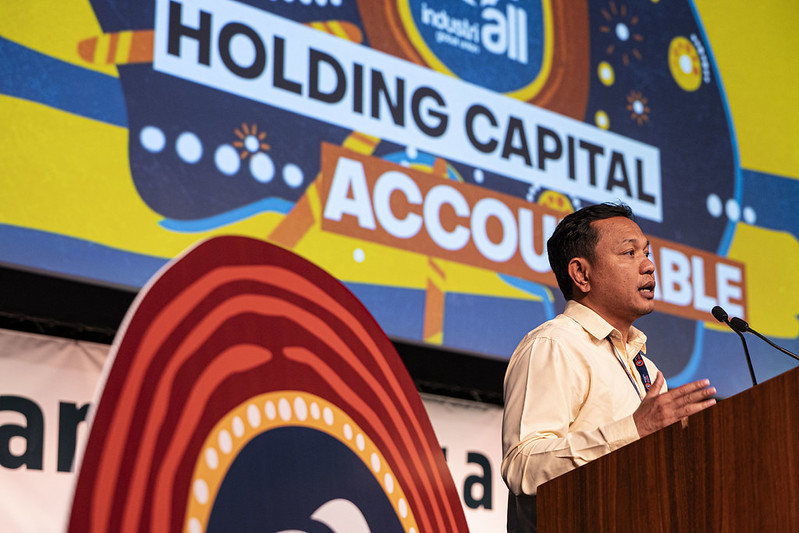
Athit Kong, Cambodia
A just transition led by workers
Climate change, automation and the shift to renewable energy are transforming industries. Congress delegates agreed that these changes must be shaped, not suffered, by workers. Assistant general secretary Kan Matsuzaki said that only a strong, organized labour movement can ensure a Just Transition that protects jobs, communities, and dignity.
Panelists from Australia, Germany, South Africa, Singapore, Morocco and Colombia shared lessons from real transitions underway: start early, protect workers and communities, train for new skills, and keep public control of energy.
Lively debates followed on each of the four action plan sessions where delegates reaffirmed IndustriALL’s commitment to equality, democracy and peace, discussing issues from their countries and industrial sectors, sharing wins and struggles and showcasing global solidarity.
Congress adopted a number of resolutions:
- Resolution on trade – international trade must work for working people. We will defend sustainable, fair, union-protected jobs.
- Feminist resolution – feminism is a tool to eliminate all forms of opression and discrimination and to build democratic unions.
- Resolution on protecting global peace – a call to all states, institutions, NGOs and people to work together to build a world of lasting peace, where justice and human rights are achieved for all people.
- Emergency resolution condemning the brutal attacks on SEGAL workers in Liberia, where striking security guards were beaten and arrested while protesting poverty wages and lack of social protection.
Congress elected Christiane Benner, president of IG Metall, as IndustriALL’s new president. Atle Høie was re-elected as general secretary, as were the three assistant general secretaries, Christina Olivier, Kemal Özkan and Kan Matsuzaki. Congress also elected vice presidents – Akihiro Kaneko, Asia-Pacific, Michel Maicon Vasconselos da Silva, Latin America and the Caribbean, Habib Hazemi, Middle East and North Africa, Roxanne Brown, North America, Rose Omamo, Sub-Saharan Africa, and Marie Nilsson, Europe –, as well as members for the Executive Committee for the next Congress period.
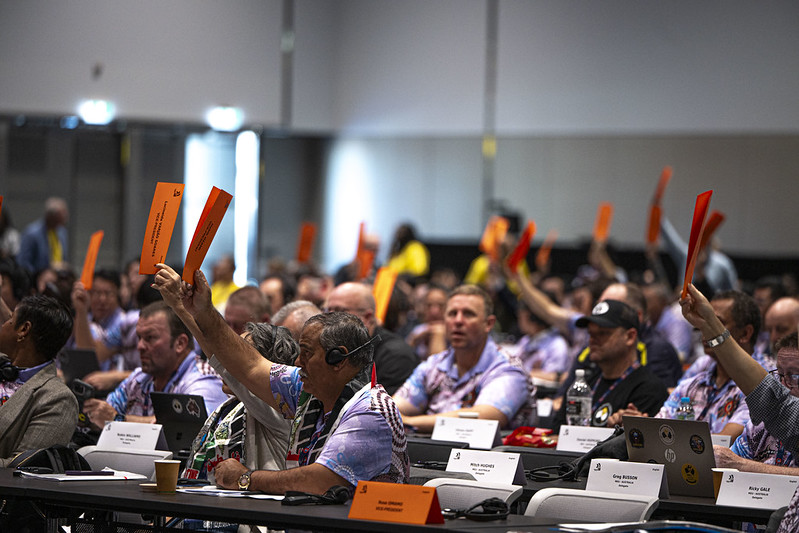
As the Congress closed, newly elected president Christiane Benner thanked delegates for the energy and courage that carried the event:
“Some of us risk our freedom and even our lives when we organize workers. We promise: we will fight side by side. Our common vision is a world where everybody has work security, income security, social security, and freedom of association and speech.”
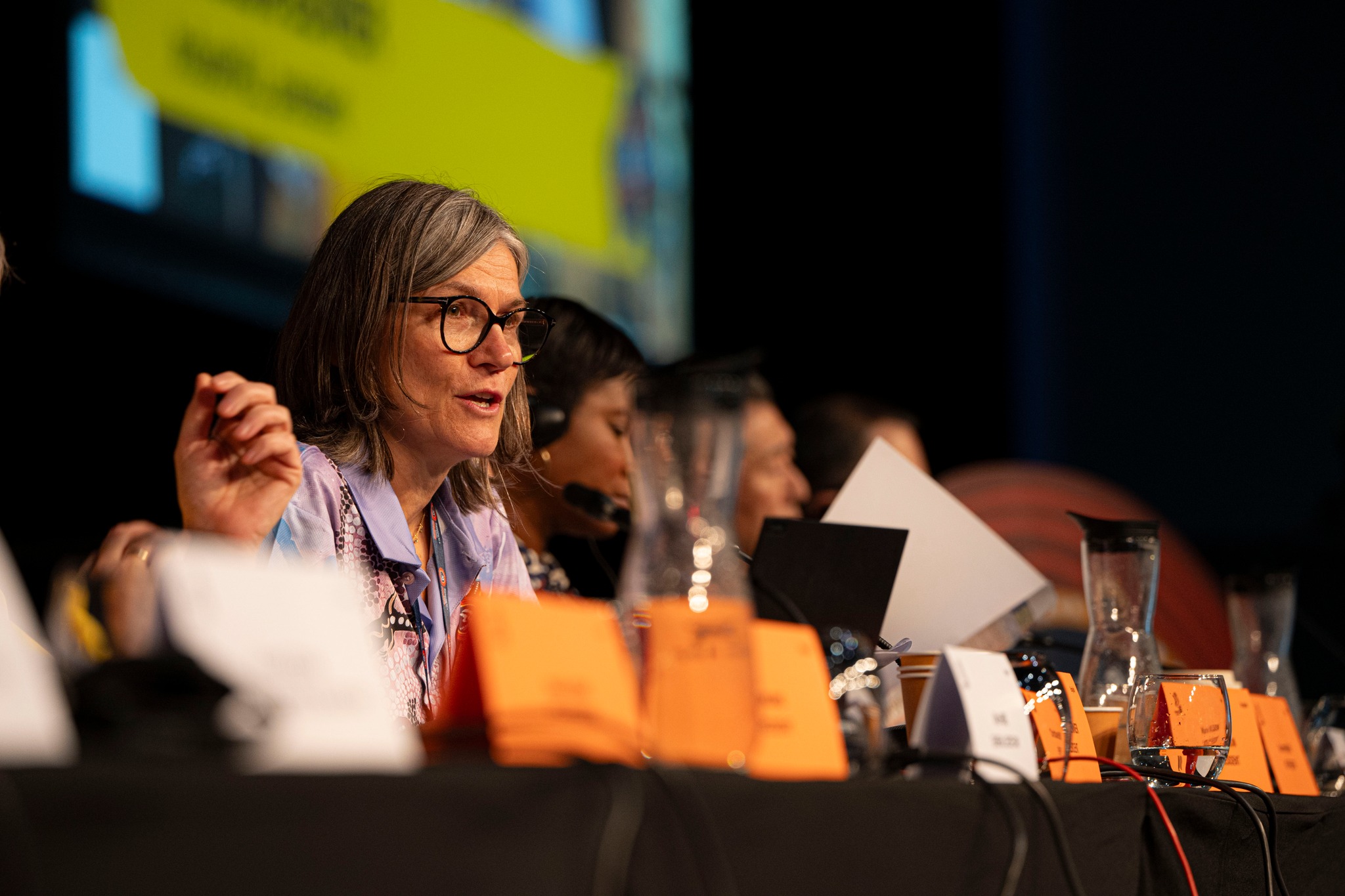
IndustriALL president Christiane Benner
